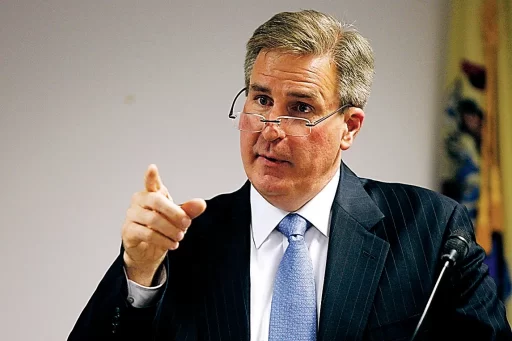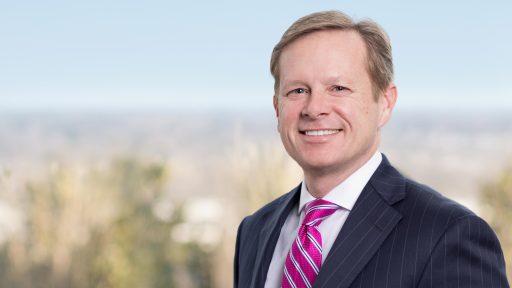Brett Schundler was the first Republican to be elected mayor of Jersey City, New Jersey, since the First World War. He serves in the most ethnically diverse city in the United States, one that is only six percent Republican. He is currently in his second full term as mayor, is considering a run for governor of New Jersey, and has even been targeted as a future presidential contender. Schundler is also nationally recognized for his initiatives in reforming public education. He is a graduate of Harvard University and is a former Wall Street securities consultant. He is a devoted Christian and is married with two children..
NeoPolitique interviewed Mr. Shundler at Regent University in Virginia Beach after his appearance at Regent’s Profiles in Excellence lecture series on November 30, 1999.
NP: What led you from Wall Street to the mayor’s office?
BS: There was a whole series of serendipitous events that resulted in my ultimately running. What led to a break with Wall Street was the fact that we made a lot of money. My wife and I always wanted to travel. We thought if we were going to do some traveling, we’d better do it before we start having children. So we quit our job and we traveled for a year. We spent the spring of 1990 watching communism come down. We would read the newspaper, see where the next revolution was going to happen, then we’d go to watch it. When we came back, I thought I’d might go back to Wall Street eventually, but instead of going back right away, I looked at some other possibilities. I thought I’d help someone run for state Senate. I couldn’t find anyone who wanted to run, so I ended up running. I didn’t think I could possibly win, but I did very well. The key issue was to show the machine that they had to become more responsible and less abusive. We almost won that election. A couple of months later the mayor was convicted of different crimes and went off to jail. They called a special election for mayor and I won.
NP: Now that you are considering a run for governor, has this also been caused by a series of serendipitous events or has it been a long term goal?
BS: It’s not been a long term goal.
NP: Has your disappointment in the current governor, especially with regard to education reform and school vouchers, influenced your decision to run for governor?
BS: Yes. If we could have gotten vouchers passed and some other things done, I might have looked at doing something else. But, to me, education is the most important issue. And the way that I look at it is that if I run [for governor], and if I don’t win, then what I will probably do is continue to work on passing school choice legislation….
If we are going to make another run ultimately to pass school vouchers, we are going to need a governor that’s willing to fight for it. It’s hard enough with a governor who’s willing to fight for it, its almost impossible if the governor is not.
NP: Concerning education reform, there are some conservatives and libertarians who would say that your support of charter schools and publicly-funded vouchers would undermine privately-funded voucher initiatives and that public funds are only going to corrupt the private sector with government strings. How would you respond?
BS: The idea is that if the government gives you money, they are going to try to regulate you. I would say they’re going to try to regulate you whether they give you the money or not. HR6 was an example a couple of years back when the government tried to regulate homeschooling. They weren’t giving any money to homeschoolers but they wanted to regulate them.
Ask any businessman who has never gotten a dime from the government, who pays taxes through the nose, and yet the government still tries to regulate him left, right, and center. So the interest of government in regulating you is going to be a permanent one. Part of the human condition is that people want to expand their power. The issue becomes: How do you create people who will fight for their own freedom and who will defend against government encroachments on [their] liberty? I would say one of the ways to do that is by educating them about the value of liberty by having them experience the value of liberty.
Specifically on education, my sense is that power should be kept as close to people as possible. The first thing I would do is I would say that if you want to put your child in private school, you’re going to get a tax credit where you can use your own money to cover tuition. I would support passing a voucher bill in cities and outside cities.
Additionally, I would support a significant deregulation of the public schools and I would support significant expansion of charter schools. Charter schools in New Jersey are under all the regulations of the state, are fully-funded by the state, and are not allowed to have admission criteria–totally open. But they are not politically controlled–no election for members. So you end up having deregulated community schools on the one hand and government schools that are not politically controlled on the other. I would argue that you would end up having a much better government school sector, as well as [giving] parents the liberty of looking at independent and release schools.
With the government schools I think you should have very high standards. It shouldn’t just be about math and reading skills. One of the areas we should have improvement in terms of content is how we teach about America’s history. For instance, when you teach about Thanksgiving, you should teach that they were thanking God and not the Indians. A bill that we are pushing right now in New Jersey that has great significance is a bill to have a portion of the preamble of the Declaration of Independence recited after the Pledge of Allegiance in our public schools. What this would be explicitly doing is [reminding] Americans that we have unalienable rights and that constrained by respect for rights, governments should act democratically.
NP: You’ve been mayor for seven years. Things that you speak about now are controversial in the public realm. What has been your experience over the seven years in terms of being able to introduce those kinds of Christian ideas into the public sphere?
BS: I would argue that you can win political fights on those issues if you deal with one issue at a time. If you deal with too many issues, you open yourself up to being demagogued because people won’t understand exactly what you’re trying to say. There’s just too much for them to absorb at once. Let’s say you deal with one issue at a time, you clearly explain why you believe something is important, and you fight out that issue. I would argue that the traditional American values will win if they become the substance of a public debate.
The reason I focused the [Regent University lecture] today on the unalienable rights issue is that it is pending the New Jersey legislature right now. I think that it is an extremely important issue. It is important that we spend enough time talking about it that people understand the importance of the issue. Look at the “pledge of allegiance” issue during the Bush/Dukakis presidential race–if Bush had been talking about 46 different issues, no one would have understood why the pledge is important. But because he focused on one issue and made it very clear why he thinks Dukasis’s disrespect for the pledge was important, people got it–it was important to them, and they supported Bush. Focus on one issue, fight it out, win it, and then go on to the next issue.hips.
NP: Comparing your first inaugural address with your 1997 inaugural address, were you able to be as bold in proclaiming your faith or have you established yourself and then become more bold?
BS: I don’t think I’ve become bolder. If you look at that first speech, we focused a lot on the school choice issue. That was a very controversial issue which had the most moneyed opposition in state politics. The teacher’s union is the biggest single political interest group in state politics in America. So we were talking about the most controversial issue you can get, against the most powerful opponent you can have.
The reason I think I focused on more world view-issues, or issues of faith, in the second debate is that I have become more convinced that these are some of the key issues that we have to address to keep America as a nation that puts justice first. The real debate here is what is the highest ideal, justice or democracy? The founders believed that you should have democracy within a limited sphere. The majority could do whatever it wanted as long as the majority respected a number of things that they could not justly do, such as take away your right to life or your religious freedom. This is an important issue… When you now have a Princeton University professor who says that you should be able to kill not just unborn children, but born children, sick people, handicapped people–these are some pretty scary developments reflecting some pretty significant changes in culture. If we don’t fight out these fights, we are going to lose the soul of America.
NP: Practically speaking, how has your Christian faith influenced the way you deal with the political battle?
BS: There was a piece of literature put out two days before the election that had me standing in front of a Confederate flag. It was put out in the African-American neighborhoods in Jersey City. It said I was speaking at a white supremacist organization and asked why Mayor Schundler is speaking at a “Sons of the South” convention. I was actually speaking at a Lincoln Day dinner. At this dinner there was evocative memorabilia scattered about–cannonballs, muskets, a Union flag, a Confederate flag. Someone took a photo on an angle having me by this Confederate flag–they cropped out everything else and then they put out this piece of literature. That is so horribly distasteful, but it had a very significant impact. I was polling around 59% in the African American community in the 1997 mayoral election. I ended up getting about 46% of the vote. So that piece of literature, it seems to me, knocked down my support by 13 percentage points.
You end up taking a lot of abuse in this job. And you could respond to that by becoming bitter and angry and saying that the person that attacked me is someone I’m going to hate. Now I just can’t maintain a sense of spiritual equanimity if I’m sitting there angry and hateful. You’re not going to be able to make it day by day, you’re not going to be the same person, you’re going to end up becoming an angry, hateful person. I just don’t want to become that kind of person. My Christian faith says to me to keep it all in perspective. Don’t allow yourself to be warped and crack under all of the pressures.
NP: There has been talk about “future presidential contender Brett Schunder.” What is your reaction to that?
BS: Well I don’t think about that at all.
There is a scripture that says, “Thy Word is a lamp unto my feet.” The image that that portrays to me is that you can see far enough ahead to take the next step. You can’t see way in the distance–it’s still dark. And that’s the way my life has been. There are some things that don’t change such as, “You shall love the Lord your God with all your heart,” and “love your neighbor as yourself,” these are principles to live by. But the circumstances you are in and where you put your next step, that does change. You can’t see what the train way ahead looks like or where exactly you’re gonna be. I don’t have an ambition to become something, but to be faithful. So I don’t want to lose my soul, if you will, I don’t way to lose who I am, I don’t want to lose the kind of person I feel I’m called to be.
I’m a father. I’ve got two kids. I want to be faithful to them and to my wife–that’s not going to change. But at one time I was able to make a contribution to the bigger world by being a congressional staffer. Another time by working on a presidential campaign. Another time through working on Wall Street. Now I’ve had an opportunity to make a contribution through Mayor. I never really planned on any of those things. But they presented themselves as opportunities to be faithful to be the kind of person I felt called to be.
Right now, I can’t tell you I feel called to be governor, but I do feel called right now to think about running for governor. We’ll see what God has in mind.





